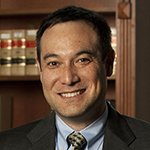From a small informal social group to a large formal political organization, groups are an important part of American life. The Constitution protects the ability for individuals to form and participate in private groups of their choosing, free from state interference. But at the same time, some groups are in tension with antidiscrimination norms.

“The balance between the liberty of private, noncommercial groups and antidiscrimination principles may never reach a ‘peaceful coexistence,’ ” says John Inazu, JD, first amendment expert and professor of law at Washington University in St. Louis.
“But our constitutional commitments give us better and worse ways of attempting to strike that balance.
“At the very least, we should expect a constitutional discourse that openly acknowledges the various interests at stake in such decisions,” Inazu says. “ But we should also hope for the robust constitutional protection of pluralism that allows private groups to flourish and holds open the possibility of genuine political difference.
Inazu offered these comments as part of his invited testimony to the United States Commission on Civil Rights briefing on “Peaceful Coexistence? Reconciling Non-discrimination Principles with Civil Liberties.” The bipartisan commission was established by the Civil Rights Act of 1957 to inform the development of national civil rights policy and enhance enforcement of federal civil rights laws. The briefing is scheduled for March 22 at the commission’s headquarters in Washington, D.C.
“We must extend broad protections not only to formal, political, expressive groups but also to groups that are informal, pre-political, and organized for other than expressive purposes,” Inazu says.
“Without these protections, the grand experiment of permitting genuine political difference comes to an end,” he says. “ Because while some political expressions occur spontaneously, most do not.”
View Inazu’s complete testimony here.